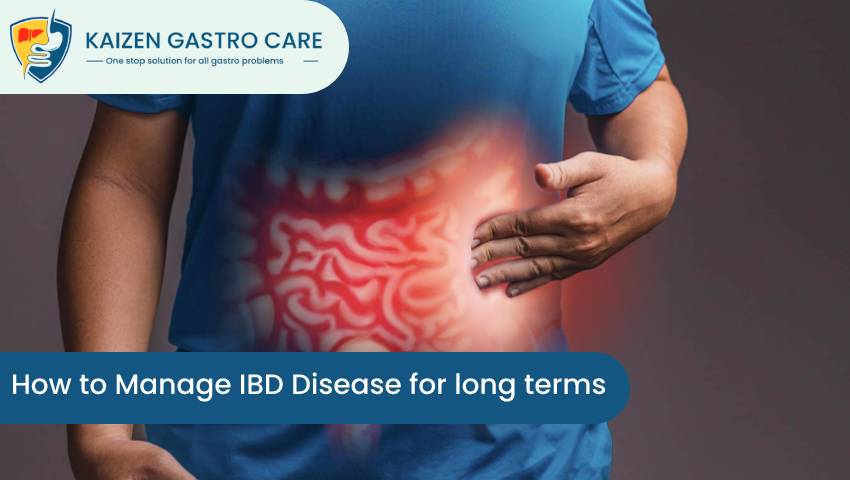
- 11/10/2022
- Kaizen Gastro Care
- 0 Comments
- Digestive Disorder
How to Manage IBD Disease for long terms
7 Tips to Manage IBD Disease for Long Terms:
Inflammatory bowel disease (IBD) is a term used to describe Crohn’s disease (CD) and ulcerative colitis (UC). There is no medical cure for either ulcerative colitis or Crohn’s disease. But there are ways to help manage the disease and control it to prevent flare-ups and complications. Patient involvement and education are necessary components of effective management. Management efforts in inflammatory bowel disease are directed at decreasing or eliminating symptoms, thereby improving the patient’s quality of life. If IBD Diseases not treating (or undertreating) the disease, then such worsening disease activity, cancer, need for surgery, and pregnancy issues.
The primary aims of Dr. Vikrant Kale at Kaizen IBD Care of IBD management are to induce and maintain remission, reduce the risk of complications and improve patient quality of life. In patients with chronic conditions such as Crohn’s Disease and Ulcerative Colitis, managing medications is like a delicate balancing act. In this article, Dr. Vikrant Kale shares some tips & facts about managing IBD Diseases in the Long Term. Kaizen IBD Care are help patients in the:
- Personalized well-being tips
- Practical lifestyle-focused suggestions to help to manage IBD better
- Information on diet, nutrition, medication, and relationships
1) Follow the treatment plan provided by IBD Specialist:
Take the medicine prescribed for you by IBD Specialist. Do not stop just because you feel well – discuss with your doctor if and when you can discontinue your medication. Some medications are meant for short-term use and others can be taken longer. You may require a combination of medicines. Also, your needs will likely change over time based on symptoms, flare-ups, and remissions.
2) Manage Diet & Nutrition:
Once the disease has developed, paying attention to your diet may help you reduce symptoms, replace lost nutrients, and promote healing. Keeping a food diary can be a big help. It allows you to see the connection between what you eat and the symptoms that may follow. If certain foods are causing digestive problems, then try to avoid them. Maintaining proper nutrition is important in the management of IBD disease. Abdominal pain and fever can cause loss of appetite and weight loss. Diarrhea can rob the body of fluids, minerals, and electrolytes. These are nutrients in the body that must remain in proper balance for the body to function properly. That doesn’t mean that you must eat certain foods or avoid others. Most doctors recommend a well-balanced diet to prevent nutritional deficiency. A healthy diet should contain a variety of foods from all food groups. Meat, fish, poultry, and dairy products (if tolerated) are sources of protein; bread, cereal, starches, fruits, and vegetables (if tolerated).
3) Avoid Smoking & Alcohol:
4) Manage Stress & Emotional Factors:
5) Keep General health maintenance:
IBD disease patients need to continue general health maintenance. While working with Dr. Vikrant Kale- IBD Specialist in India, also remembers to speak with his primary care provider about other important issues, including vaccinations, oral health, vision, heart, breast, and prostate screening, and periodic blood testing. It’s an Important Parameter to manage general health.
6) Take Support:
7) Regular checks up & Follow up with IBD Specialist:
There’s no doubt that living with this disease is challenging—you have to take medication and, occasionally, make other adjustments. It’s important to remember that most people with IBD disease need regular follow up with IBD Specialists. Dr. Vikrant Kale at Kaizen IBD Care gives better treatment with support. For more information about IBD treatment & Long term management, Visit Kaizen Gastro Care, Wakad.
